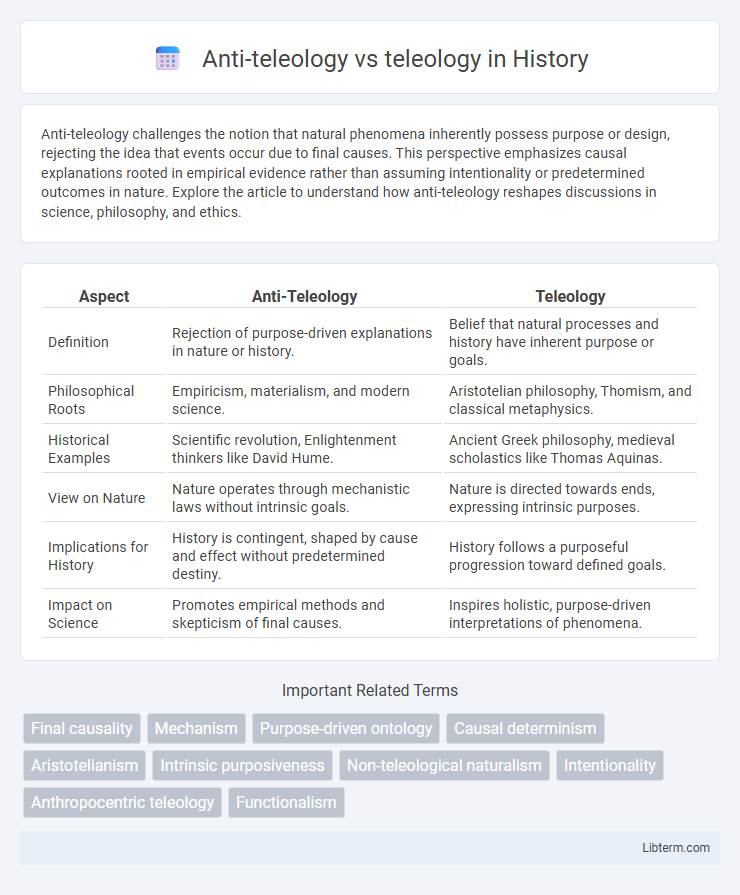Anti-teleology challenges the notion that natural phenomena inherently possess purpose or design, rejecting the idea that events occur due to final causes. This perspective emphasizes causal explanations rooted in empirical evidence rather than assuming intentionality or predetermined outcomes in nature. Explore the article to understand how anti-teleology reshapes discussions in science, philosophy, and ethics.
Table of Comparison
| Aspect | Anti-Teleology | Teleology |
|---|---|---|
| Definition | Rejection of purpose-driven explanations in nature or history. | Belief that natural processes and history have inherent purpose or goals. |
| Philosophical Roots | Empiricism, materialism, and modern science. | Aristotelian philosophy, Thomism, and classical metaphysics. |
| Historical Examples | Scientific revolution, Enlightenment thinkers like David Hume. | Ancient Greek philosophy, medieval scholastics like Thomas Aquinas. |
| View on Nature | Nature operates through mechanistic laws without intrinsic goals. | Nature is directed towards ends, expressing intrinsic purposes. |
| Implications for History | History is contingent, shaped by cause and effect without predetermined destiny. | History follows a purposeful progression toward defined goals. |
| Impact on Science | Promotes empirical methods and skepticism of final causes. | Inspires holistic, purpose-driven interpretations of phenomena. |
Understanding Teleology: Purpose in Nature
Teleology examines the inherent purpose or goal-directedness in natural phenomena, positing that elements within nature function with a specific end or design in mind. Anti-teleology rejects this idea, arguing that natural processes occur without predetermined purposes, emphasizing causal mechanisms and random events instead. Understanding teleology involves exploring how biological functions and structures appear to be optimized for survival and reproduction, suggesting an intrinsic purpose in the natural world.
Defining Anti-Teleology: The Rejection of Intrinsic Purpose
Anti-teleology rejects the concept that natural phenomena possess intrinsic purpose or inherent goals, contrasting directly with teleology's assertion of goal-directed processes in nature. It argues that events and objects do not exist for an end, emphasizing mechanistic explanations grounded in causality rather than purpose. This perspective influences scientific and philosophical discussions by prioritizing empirical evidence and observable functions over assumed existential aims.
Historical Perspectives: Teleology from Aristotle to Modern Thought
Teleology, rooted in Aristotle's philosophy, posits that natural phenomena have inherent purposes, shaping classical and medieval scientific interpretations. The Enlightenment challenged teleological views through mechanistic explanations, leading to anti-teleology emphasizing causality without intrinsic purpose. Modern thought revisits teleology in evolutionary biology and philosophy, balancing teleological insights with empirical rigor and rejecting deterministic final causes.
Anti-Teleological Movements in Philosophy and Science
Anti-teleological movements in philosophy and science reject purpose-driven explanations, emphasizing naturalistic and mechanistic processes instead. These movements gained momentum during the Enlightenment and further advanced with Darwinian evolution, which explained biological complexity without invoking design or goals. Prominent figures like David Hume critiqued teleological arguments, while modern science relies on empirical evidence to describe phenomena without implying inherent purpose.
Teleology in Biology: Design or Evolution?
Teleology in biology explores whether organisms exhibit purpose-driven design or arise through evolutionary processes without inherent goals. Proponents argue biological features demonstrate complexity and function suggesting intentional design, while evolutionary theory explains these traits as adaptations shaped by natural selection over time. Empirical evidence from genetics, fossil records, and observed evolutionary mechanisms supports evolution as the primary driver, challenging strict teleological interpretations.
Anti-Teleology and Mechanistic Worldviews
Anti-teleology rejects the idea that natural processes or entities possess inherent purposes or goals, promoting a mechanistic worldview where phenomena are explained solely by physical causes and laws. This perspective is central to mechanistic philosophy, which interprets biological and physical events as outcomes of causal interactions without invoking purposeful design. Emphasizing materialism and empirical science, anti-teleology challenges teleological explanations that attribute meaning or direction to natural occurrences.
Impacts on Ethics: Teleological vs. Non-Teleological Moral Theories
Teleological moral theories, such as utilitarianism, base ethical judgments on the consequences of actions, emphasizing outcomes like happiness or well-being, which can lead to flexible and context-sensitive decision-making. Anti-teleology or non-teleological approaches, including deontology, prioritize adherence to moral rules or duties regardless of outcomes, ensuring consistency and respect for individual rights. The tension between these views impacts ethical frameworks by shaping how moral responsibility and justification are evaluated, influencing debates on moral absolutes versus situational ethics.
Teleology in Religion and Theology
Teleology in religion and theology posits that the universe and human life have inherent purpose and design, often attributed to a divine creator. This perspective interprets natural phenomena and moral order as evidence of intentional creation, emphasizing that existence is directed toward specific ends. Teleological arguments, such as the cosmological and teleological arguments for God's existence, play a central role in classical theological doctrines and religious philosophy.
Critiques and Counterarguments: Debating Teleological Explanations
Critiques of teleology argue that explaining phenomena by inherent purposes imposes human-like intentions on natural processes, which may lack empirical support and hinder scientific inquiry. Counterarguments emphasize that teleological explanations can offer meaningful insights into biological functions and complex systems by highlighting goal-directed behavior without invoking supernatural design. Debates continue over whether teleology provides a legitimate framework for understanding causality or merely anthropomorphizes natural occurrences.
Contemporary Relevance: Teleology, Anti-Teleology, and Future Discourse
Contemporary relevance of teleology and anti-teleology lies in their influence on ethical frameworks and scientific paradigms, shaping debates on purpose and causality in nature and human action. Teleology supports goal-oriented explanations in biology and technology, while anti-teleology emphasizes mechanistic and evolutionary processes without inherent purpose. Future discourse will likely explore integrative models that reconcile purposive interpretations with empirical evidence to address complex phenomena in philosophy, science, and artificial intelligence.
Anti-teleology Infographic

 libterm.com
libterm.com